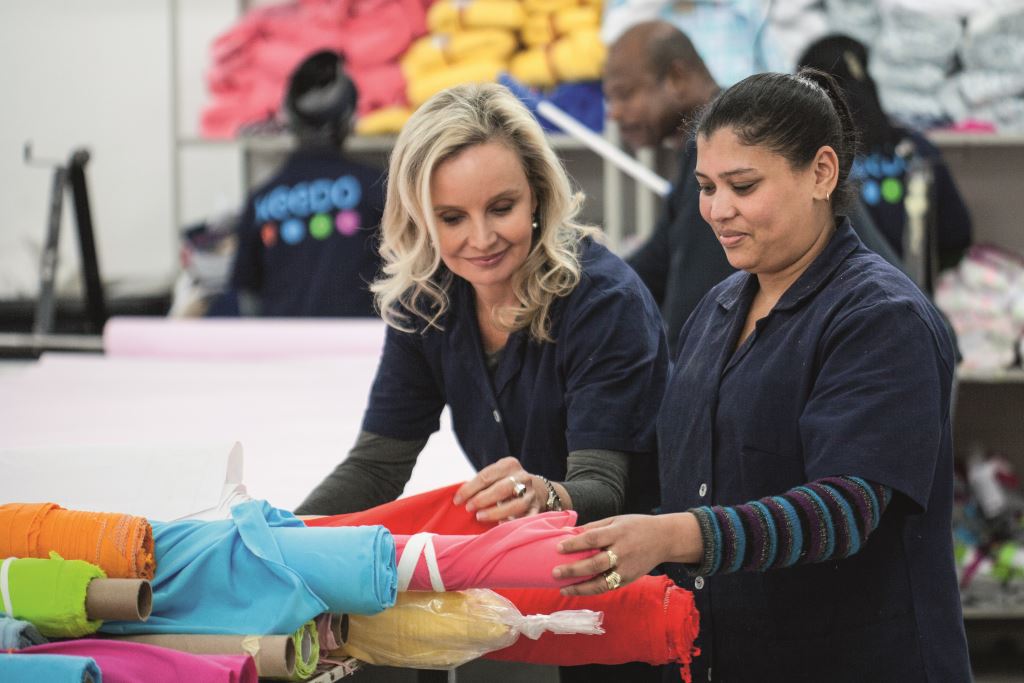Success stories in South Africa’s clothing industry are few. They are about as rare as finding a standard white T-shirt in your local mass market retailer without the ubiquitous ‘Made in China’ label attached.
The clothing industry has lost around 150,000 jobs since 1996 as it valiantly fought, and lost, the tornado of imports of fast, cheap and disposable fashion from the Far East. It’s estimated that 90% of the clothes hanging on rails in South Africa today have made their way to local shores in vast container-loaded cargo ships chugging across the Indian Ocean.

It’s the eulogy of a globally uncompetitive economy. And yet, the patient shows signs of life.
Keedo Clothing, a children’s clothing company, is thriving 21 years after its inception. All items are manufactured by a team of 100 seamstresses in Cape Town’s industrial belt and sold in company-owned stores around South Africa as well as exported to 16 countries worldwide.
Loading...
“Keedo has weathered the 2008 global recession, a flood of cheap Chinese and other clothing imports, a disastrous cotton harvest in 2010 and the collapse of the local textile industry,” says Nelia Annandale, Keedo’s founder.
Keedo began to take form in 1991, shortly after the birth of Annandale’s twins.
“After they were born, I realized that there was not much available in South Africa in terms of children’s clothes which was fun and one hundred percent cotton and good enough for my beautiful offspring.”
Necessity is the mother of invention, as they say, and Annandale created clothing patterns, dyed fabric and stitched up tiny t-shirts, shorts and dresses – all on her kitchen table. But it wasn’t until two years later, in 1993, that inspiration to sell the garments commercially struck.
“I was involved in a near fatal skiing accident which left me in a hospital bed for weeks. During one of my sleepless nights, I realized I had to do something to combine my passion for children, my passion for clothing, for nature all in one and create a brand,” she says.
Annandale had no funds, no formal business training and no experience to speak of but she did have clothing samples; which she took in a brown paper packet to her bank manager’s office and asked for a loan.
“Luckily, my bank manager was a woman so when she touched the clothing she knew it was special. I was granted a little loan and that was what I used to start my business.”

The first Keedo store opened in 1994 but the company was still very much a one-woman show with Annandale making patterns, cutting, sewing and hand-drawing pictures of animals on the fabric which are core to the company’s nature conservation identity. The shop was tucked away in Cape Town’s sleepy northern suburbs – a good 30-minute drive from the city’s flashy tourist attractions and coastline. This is why it came as a surprise when a Swiss tourist wandered into the store with her small child and bought up a good portion of the merchandise on offer. She returned a little later with a proposition to take Keedo to Europe.
“She called me the day before she was due to fly home and asked if she could take my clothing to Switzerland. She bought a box full of samples and tried it out at an informal market. Three months later, we opened the first international Keedo store in Baden, Switzerland.”
Annandale has spent the two decades since then completely immersed in her company; although these days, she spends less time cutting and sewing and more on conceptualizing new product lines and driving strategic decisions. She is still inspired by children and nature.
Annandale won an award at the International Women’s Entrepreneurial Challenge; the 9th Annual Award for Top Women Successfully Leading Business: Top Gender Empowered Company: SMME; the Cape Chamber of Commerce Exporter of the Year Award in the design category and was named the Business Woman of the Year at the Black Business Quarterly Awards in recognition for her role in transformation.
Woman make up 85% of Keedo’s workforce and the majority of them are single mothers. Annandale says the defining moments in her career are those in which she has had the opportunity to witness women grow from being shy and uneducated to confident individuals in charge of their own lives and jobs.
Her dream for Keedo is that it remains a South African-manufactured product and continues to create jobs in her homeland.
Loading...
